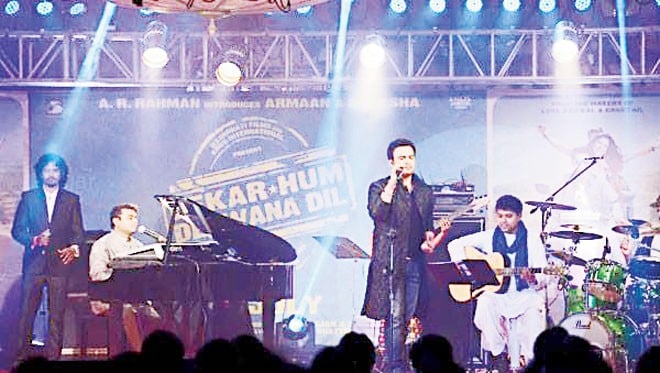

Before Lekar Hum Deewana Dil hit theatres, its star Armaan Jain’s main claim to fame was his Kapoor connection. His relationship with his famous cousins Karisma, Kareena and Ranbir and snippets of their family life added much-needed masala to any story about the little-known actor. But if Jain had hoped that the release of LHDD would finally get people talking more about his acting chops and less about his family tree, he must be sorely disappointed. His performance can be termed average at best; in fact, everything about the movie screams ‘mediocre’, from the script to the acting to AR Rahman’s music.
While the album makes for passable listening, with one or two tracks that really stand out, one wonders if this is the same Rahman who gave us the haunting Dil Se or the unforgettable Lagaan. You might argue that these two soundtracks belong to another, better, generation of Bollywood music, a time before Honey Singh numbed our auditory senses with his banal rap and lyrics such as "Mujhay apni bana lay caller tune" were considered perfectly acceptable. But when you consider Rahman’s other recent offerings, Raanjhana and Highway, you’ll realize the maestro can still churn out timeless pieces in a landscape dotted with music that has an increasingly limited shelf life.
The LHDD soundtrack suffers not only from a lack of originality but also from the high expectations one has from Rahman’s work. Other than Shiraz Uppal’s ‘Alaahada’ -which we will come to in just a bit – the two best tracks on the album, ‘Khalifa’ and ‘Maloom’, grow on you only after repeated hearings. ‘Khalifa’ is a peppy youth anthem too similar to club tracks from previous films to be notable. It will become a dance-floor favourite come the wedding season, but that isn’t much in the way of accolades. ‘Maloom’ is the requisite Bollywood rom-com number – the kind where the male lead gets to show off his boyish charm and act like a lovesick puppy. Luckily for Armaan, the song, with its retro, guitar-heavy sound, is quite charming and lets him get his ‘cute’ on without bordering on the saccharine.
There is promise here in the form of ‘Mawali Qawwali’, with its tribal beats and energetic composition. Unfortunately, it is never fully realized because the song suffers from a bit of an identity crisis. Is it a qawwali? An item number? Or just a display of poor poetic skills? With trite lines such as "Mawali qawwali, tu phuljhari, aur mein Diwali" galore, it seems lyricist Amitabh Bhattacharya penned a large portion of the song in his sleep. But then he has a history of coming up with bizarre lyrics.
‘Alaahada’ is easily the star of the show and revives Shiraz Uppal’s very successful collaboration with Rahman. The two gave us the brilliant title track from last year’s Raanjhana and continue to enthrall with their latest venture. Uppal’s soulful rendition of the song elevates it from just another sappy, melodramatic Bollywood tune of heartbreak to a mesmerizing melody filled with angst and romance in equal doses. The song is ruling the airwaves and Uppal is finally being recognized as the remarkable singer that he is. It’s good to see the artist come out from under the radar and take center stage in Bollywood, where other musicians from Pakistan, often not as talented but with better PR machines, enjoy greater fame.
Unfortunately, one good song does not a memorable soundtrack make. Lekar Hum Deewana Dil is not a patch on Rahman’s earlier work. At best, the album will provide pleasant background music but a couple of listens later, you’ll find yourself deleting it from your music library to make room for something with a longer shelf life.